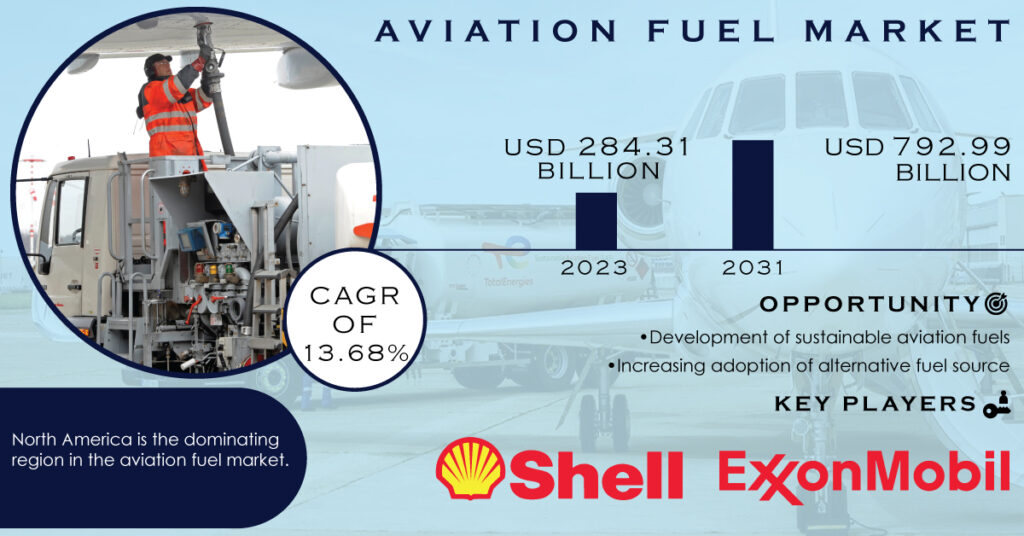
Aviation Fuel Market Overview:
The rising demand for air travel and expansion of the aviation industry are key factors driving the growth of the Aviation Fuel Market.
The Aviation Fuel Market, as per the SNS Insider report, recorded a size of USD 284.31 Million in 2023. It is anticipated to achieve a valuation of USD 792.99 billion by 2031, experiencing a compound annual growth rate (CAGR) of 13.68% throughout the forecast period from 2024 to 2031.
Major Key Players Included are:
- Exxon Mobil Corporation
- Royal Dutch Shell plc
- Chevron Corporation
- Indian Oil Corporation Ltd
- British Petroleum
- Oman Oil Company SAOC
- TOTAL S.A
- Total Energies
- Valero Energy Corporation
- Petróleo Brasileiro S.A., and other key players.
Get a Sample Report of Aviation Fuel Market @ https://www.snsinsider.com/sample-request/2940
Market Report Scope
Aviation Fuel is a specialized form of refined petroleum designed specifically for aircraft use, with Jet A and Jet A-1 being the main categories. The fuel is carefully crafted to provide optimal energy density, volatility, and stability for safe and efficient flight. Regulations by agencies like the FAA and ICAO ensure quality and safety throughout the production and distribution processes. However, the combustion of Aviation Fuel leads to the emission of greenhouse gases, impacting the environment. Therefore, there is a rising interest in developing alternative fuels to lessen the environmental impact of aviation.
Market Analysis
A significant increase in the Aviation Fuel market has been achieved due to growing demand for air travel and technical progress with aircraft that are more fuel efficient. The demand for Aviation Fuel is rising, due to the projected increase of 34 % in global passenger aircraft over the next decade. The development of more fuel efficient aircraft, reduced fuel consumption and a positive impact on the market have been brought about by technology developments. In addition, the development of alternative fuels such as biofuels has been driven by the industry’s focus on environmental sustainability, which has increased the market for Aviation Fuels. Overall, there are lucrative opportunities for fuel suppliers on the global market due to the expansion of the aviation sector, together with the development of fuel efficiency and sustainability.
Check Discount on Aviation Fuel Market @ https://www.snsinsider.com/discount/2940
Segment Analysis
The Aviation Fuel market is currently dominated by jet fuel, driven by its widespread usage in commercial and military aircraft. Fixed-wing aircraft are the primary aircraft type in the market due to their versatility and wide application in various sectors. The commercial sector is the leading end-user segment, with the growing demand for air travel globally fueling the need for Aviation Fuel. The expansion of the aviation industry and increasing air travel are key factors driving the demand for jet fuel, fixed-wing aircraft, and commercial Aviation Fuel usage.
Key Market Segmentation
By Fuel Type
- Aviation Gas
- Jet Fuel
- Bio Jet Fuel
By Aircraft Type
- Unmanned Aerial Vehicle
- Fixed Wing
- Rotary Wing
By End-user
- Private
- Commercial
- Military
Impact of Russia Ukraine war on the Aviation Fuel Market
The instability in the region has caused disruptions in the supply chain, resulting in increased prices and decreased availability of Aviation Fuel. The conflict has resulted in the imposition of sanctions by the International Community, which have made matters worse. One year following Russia’s invasion of Ukraine, the cost of jet fuel in Europe increased by approximately 1/3 compared to 2019. This increase in fuel costs can account for 25-45% of the unit cost, ultimately reflected in higher fares for consumers. Additionally, the conflict has caused a decline in air travel, resulting in a decrease in demand for Aviation Fuel, leading to a surplus of fuel in some areas while other regions are experiencing shortages.
Impact of ongoing recession on the Aviation Fuel Market
The downturn in the global economy has led to a decrease in air travel, resulting in a decline in demand for Aviation Fuel. This has resulted in a surplus of Aviation Fuel, which has led to a decrease in prices. Airlines have benefited from the decrease in prices, which has enabled them to reduce their operating costs. However, it has had a negative impact on fuel suppliers and producers, who have seen a decrease in their profits. Furthermore, the recession has led to a decrease in investment in the aviation industry, resulting in a decreased research and development of alternative fuels.
Enquire about the Report @ https://www.snsinsider.com/enquiry/2940

Key Regional Development
North America is the dominating region in the Aviation Fuel market due to its extensive network of refineries and pipelines, technological advancements, and highly skilled workforce. The region has invested heavily in research and development, resulting in the creation of more efficient and environmentally friendly fuels. This has also helped to reduce the costs of air carriers, while minimising their impact on the environment. The Asia Pacific region is poised to experience the highest CAGR in the Aviation Fuel market due to its rapidly expanding aviation industry, increasing demand for air travel, and favorable government policies promoting the use of cleaner and more efficient fuels.
Key Takeaways for Aviation Fuel Market Study
- The rising demand for air travel and expansion of the aviation industry are key drivers of growth in the Aviation Fuel
- Technological advancements and government regulations promoting the use of alternative fuels are key factors shaping the future of the Aviation Fuel
- As the aviation industry continues to expand, there is a growing focus on the development and adoption of sustainable Aviation Fuels to reduce carbon emissions and environmental impact.
Recent Developments
- ExxonMobil developed a new process technology to produce sustainable Aviation Fuel from renewable methanol.
- Royal Dutch Shell plc announced plans to produce 2 million tonnes of sustainable Aviation Fuel per year by 2025 and aims for at least 10% of global Aviation Fuel sales to consist of SAF by 2030.
- Indian Oil Corporation started exporting Aviation Fuel for small planes and UAVs, marking India’s entry into a global market worth an estimated $2.7 billion.)
Buy Single User PDF of Aviation Fuel Market Report @ https://www.snsinsider.com/checkout/2940
Table of Contents – Major Key Points
- Introduction
- Research Methodology
- Market Dynamics
- Impact Analysis
- COVID-19 Impact Analysis
- Impact of Ukraine- Russia war
- Impact of ongoing Recession
- Value Chain Analysis
- Porter’s 5 Forces Model
- PEST Analysis
- Aviation Fuel Market Segmentation, By Fuel Type
- Aviation Fuel Market Segmentation, By Aircraft Type
- Aviation Fuel Market Segmentation, By End-user
- Regional Analysis
- Company Profiles
- Competitive Landscape
- Conclusion
About Us:
SNS Insider is one of the leading market research and consulting agencies that dominates the market research industry globally. Our company’s aim is to give clients the knowledge they require in order to function in changing circumstances. In order to give you current, accurate market data, consumer insights, and opinions so that you can make decisions with confidence, we employ a variety of techniques, including surveys, video talks, and focus groups around the world.
Our staff is dedicated to giving our clients reliable information, and with expertise working in the majority of industrial sectors, we’re proud to be recognized as one of the world’s top market research firms. We can quickly design and implement pertinent research programs, including surveys and focus groups, and we have the resources and competence to deal with clients in practically any company sector.
Read Our Other Aerospace & Defense Related Reports

